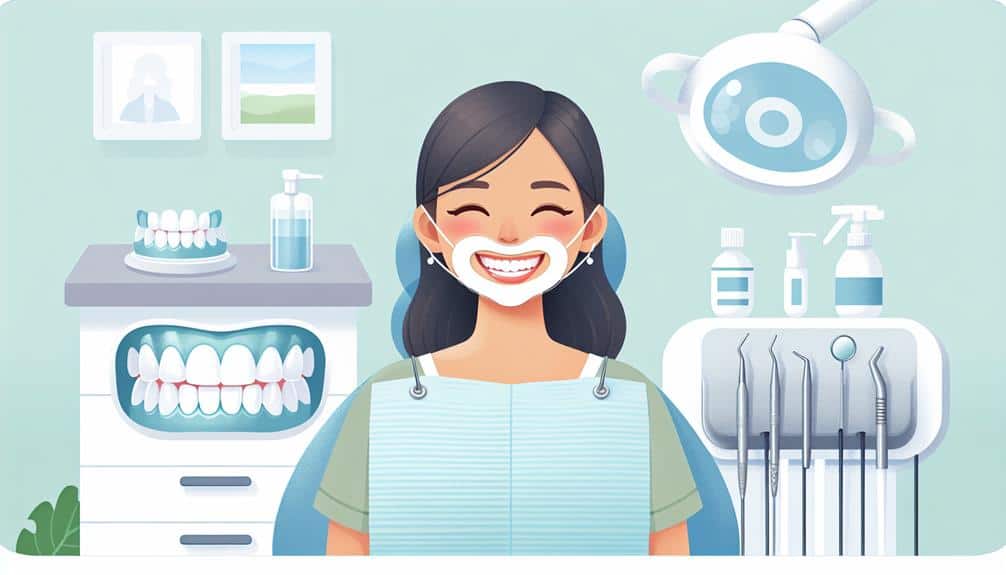To prevent gum irritation during teeth whitening, it is crucial to maintain healthy gums through proper oral care practices like regular brushing, flossing, and dental check-ups. It is also important to be aware of potential triggers for sensitivity, such as using high concentrations of whitening solutions or poorly fitting trays that may allow the gel to come into contact with your gums. Choosing the right concentration of whitening agent, using properly fitting trays, and applying the gel gently can help minimize discomfort. Additionally, adjusting the frequency of whitening sessions, allowing your gums time to recover, and using desensitizing toothpaste or petroleum jelly are effective strategies for managing and preventing irritation. Seeking guidance from a dental professional for personalized advice can further optimize your teeth whitening experience.
Key Points
- Use properly fitted trays to prevent whitening gel contact with gums.
- Maintain good gum health through regular oral hygiene practices.
- Consult with a dentist for personalized whitening recommendations.
- Opt for whitening products with appropriate whitening agent concentrations.
- Consider desensitizing agents or alternatives for sensitive gums.
Understanding Gum Sensitivity
To prevent gum irritation during teeth whitening, it's important to understand the factors contributing to gum sensitivity. Gum health plays a vital role in the overall well-being of your mouth. Healthy gums are less likely to experience sensitivity triggers during teeth whitening procedures. Maintaining good gum health through regular brushing, flossing, and dental check-ups can help minimize the risk of irritation.
Sensitivity triggers such as gum disease, thin gum tissue, and certain medical conditions can make your gums more susceptible to irritation during teeth whitening. Gum disease weakens the gum tissue, making it more prone to sensitivity. Thin gum tissue provides less protection, increasing the chances of irritation. Medical conditions like diabetes or autoimmune disorders can also affect gum health, leading to heightened sensitivity.
Causes of Gum Irritation
Understanding the reasons for gum irritation during teeth whitening procedures is essential for maintaining excellent oral health and preventing discomfort. Gum irritation can arise from various factors, including the concentration of the whitening agent used. High concentrations of whitening solutions may lead to irritation if they come into direct contact with the gums for an extended period. Additionally, ill-fitting whitening trays can allow the whitening gel to seep onto the gums, causing irritation.
Another common cause of gum irritation during teeth whitening is aggressive brushing or rubbing of the whitening gel onto the teeth. Excessive pressure during the application process can irritate the gums, leading to discomfort. Moreover, some individuals may be more prone to gum irritation due to underlying oral health conditions such as gum disease or sensitive gums.
To prevent discomfort and maintain excellent oral health during teeth whitening, it's crucial to ensure the correct concentration of the whitening agent, use properly fitted whitening trays, and apply the gel gently to avoid unnecessary pressure on the gums.
Tips for Preventing Irritation
Prevent gum irritation during teeth whitening procedures by ensuring the correct concentration of the whitening agent and using properly fitted trays to avoid gel seepage onto the gums. Maintaining good gum health is vital during the whitening process. Before starting any whitening treatment, consult with your dentist to determine the most suitable whitening techniques for your specific needs.
When choosing a whitening product, opt for one with the appropriate concentration of whitening agent recommended by your dentist. Using a higher concentration than necessary can increase the risk of gum irritation. Additionally, make sure the trays used for whitening are custom-fitted to your teeth to prevent the gel from coming into contact with your gums.
Properly following the instructions provided with the whitening product is essential. Be cautious not to overfill the trays with the whitening gel, as excess gel can easily spill onto your gums, causing irritation. If you experience any discomfort or notice signs of gum irritation, discontinue the whitening treatment and seek advice from your dentist promptly.
Managing Irritation During Whitening
Consider adjusting the frequency of your whitening sessions if you notice persistent gum irritation during the process. Overusing whitening products can lead to increased sensitivity and irritation. Give your gums time to recover between sessions to prevent further discomfort.
If you experience pain during whitening, you can manage it by using desensitizing toothpaste or applying a small amount of petroleum jelly to the gum line before treatment. These measures can help create a barrier between the whitening agent and your gums, reducing the likelihood of irritation.
When dealing with gum irritation, you may also want to explore product alternatives. Look for whitening solutions that are specifically formulated for sensitive teeth and gums. These products often contain lower concentrations of bleaching agents, which can be gentler on your oral tissues. Additionally, consider using whitening pens or strips instead of trays to minimize contact with your gums. By choosing the right products, you can achieve a brighter smile without compromising your gum health.
Seeking Professional Advice
For guaranteeing personalized guidance and recommendations tailored to your specific situation, consulting with a dental professional is essential when dealing with persistent gum irritation during teeth whitening treatments. Consulting experts in the field can provide you with professional recommendations that take into account your unique dental history, current oral health status, and any specific sensitivities you may have.
A dental professional will be able to assess the severity of your gum irritation, identify any underlying causes, and recommend the most appropriate course of action to alleviate your discomfort. They may suggest adjusting the concentration of the whitening solution, changing the duration of your treatments, or using desensitizing agents to help soothe your gums.
Frequently Asked Questions
Can Teeth Whitening Products Cause Permanent Damage to the Gums?
When it comes to teeth whitening products, you should be cautious about potential gum damage. Factors like improper application or prolonged exposure can harm gum health. Remember, prevention is better than cure.
Are There Any Specific Foods or Drinks to Avoid to Reduce Gum Irritation During Teeth Whitening?
To reduce gum irritation during teeth whitening, avoid acidic foods and drinks like citrus fruits and soda that can worsen sensitivity. Opt for a soft diet and stay hydrated. Follow prevention tips for gum health throughout the whitening process.
How Long Should One Wait After a Teeth Whitening Treatment Before Consuming Hot or Cold Foods and Beverages?
After a teeth whitening treatment, wait at least 24 hours before consuming hot or cold foods and beverages to reduce sensitivity. Avoid extreme temperatures to prevent discomfort. This waiting period allows your teeth to recover and minimizes potential irritation.
Is It Normal to Experience Gum Sensitivity During Teeth Whitening, and if So, How Long Does It Typically Last?
Feeling gum sensitivity during teeth whitening is common. Typically lasts a few days. To manage pain, try using desensitizing toothpaste or applying a small amount of coconut oil to the gums. Recovery time varies.
Are There Any Home Remedies or Over-The-Counter Products That Can Help Alleviate Gum Irritation From Teeth Whitening?
To ease gum irritation from teeth whitening at home, try natural remedies like aloe vera gel or chamomile tea. Avoid acidic foods and drinks, and consider using over-the-counter products like desensitizing toothpaste or mouthwash. Remember to follow precautions for best results.



